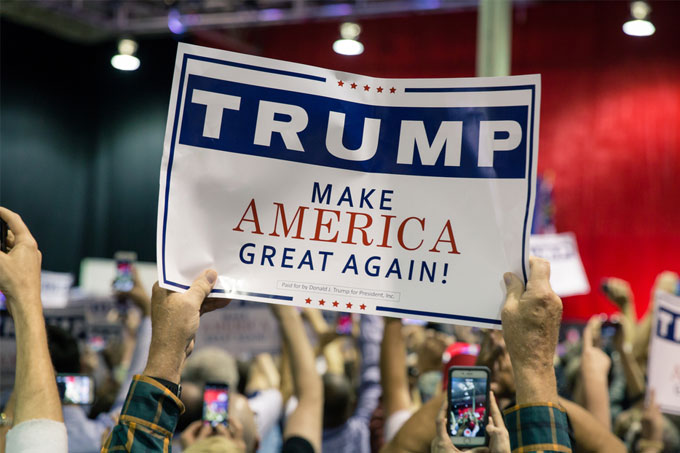On the 500th anniversary of Thomas More’s Utopia, Dr David Hitchcock considers his vision of a perfect society compared to US President-elect Trump’s ideal version of a Utopian society.
Today ironically marks the 27th anniversary of the fall of the Berlin Wall, and today also marks the beginning of the political reign in the United States of a man whose signature promise is to build a new wall, and whose signature politics seemingly herald dystopia and disaster.
November 9th is also the anniversary of Kristallnacht in 1938 Germany, and of the 18th Brumaire of Napoleon Bonaparte. This December also marks the 500th anniversary of Thomas More’s political philosophy Utopia.
I think that Donald Trump has been elected because he promised a specific set of American voters a kind of Utopia; a ‘no-place’ that does not exist but which could. A return to the values, comforts and stereotypes and inequalities of an imagined past. This is what his slogan ‘Make America Great Again’ actually means. This place comes complete with walls to keep out foreigners, an aggressive foreign policy, the apparatus of a police state, and the strict reinforcement of community social values in a manner that valorises white, male, ‘middle-class’, Christian, and heterosexual norms.
This Trumpian Utopia has, and will continue to, demonize African-Americans, Muslims, Latin-Americans, gay people, and women, and it will do so because, in the twisted, functionally eugenicist logic of creating a ‘perfect society’, one must identify groups of people to be excluded in order to continue the process of purification and perfection.
In More’s Utopia of 1516 these groups are eerily recognizable: women are free in Utopian society to fight in battle and to obtain education and positions of religious prominence, but are socially constrained by their fathers and other senior male figures in the household, and still subject to gendered constraints on their work (‘for the most part, [they] deal in wool and flax, which is suited to their weakness’), and are required to act as servants for men at banquets.
Foreigners are welcomed into Utopian society only if they fully adopt Utopian customs, the citizens of foreign nations captured in conflict are enslaved. Mobility is tightly regulated, and those caught wandering and not working are severely punished, or enslaved if they are recidivist.
It is not wrong to want one’s own social and economic conditions to be better, it is wrong to want this explicitly at the expense of others’ wellbeing, and this is something that can be taught.
Gendered, racial, and economic inequalities do not exist simply as ahistorical and impersonal forces unchallengeable by us mere mortals. These inequalities exist because we believe in them, because our societies perpetuate them, and because our attempts to imagine something truly different never seem able to leave them behind. Herein lies the trap of Utopias one and all: perfect societies from Plato’s Republic onwards have all seemingly required stark inequalities in rights, privileges and political powers in order to plausibly function.
Some of the greatest minds of the past millennium could conceive of no better way. In this millennium, if we ever want to see truly better societies which are at the root of so much of our progressive politics, then we need to tear down the walls surrounding these wishful Utopias, and genuinely include everyone in our politics. Especially those who believe in Trump’s promises.
Thomas More wrote his flawed and ironic book in part because he genuinely wanted to improve the conditions of his society, and of those crushed by its many inequalities (the first thing that goes in Utopia, by the way, is money). More also wrote Utopia in part to work out whether to go into politics and try to make things better the hard way. In end he chose to get involved, and famously—fatally—refused to sacrifice his principles when political winds started blowing the other way. All of us concerned about the political developments of these past months need to roll up our sleeves and do the same.
Dr David Hitchcock is a Senior Lecturer in History, in the School of Humanities, specialising in early modern social and cultural history of England, particularly in poverty, mobility, inequality, and also in European, comparative, and Atlantic history for a similar period.
Visit the School of Humanities to discover more about studying History at Christ Church.
 Expert comment
Expert comment Jeanette Earl
Jeanette Earl 1835
1835


